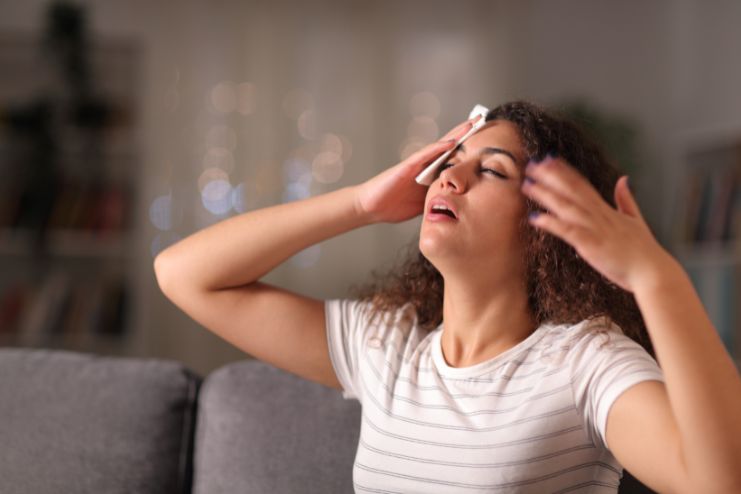Sweating is perhaps the most outward and visible and sometimes irritating outcome of exercising. Although it’s perfectly healthy to sweat during exercise, many people ask themselves: “Why do I sweat more than everyone else while working out?” If you’ve ever worked out in a gym and observed that you’re dripping wet while others shine with a faint sheen, don’t worry, you’re not alone.
The good news? In most instances, working out and excessive sweating are normal and may be a sign that your body is functioning well. Let’s look at the actual reasons behind excessive sweating during exercise, what’s normal, and when it may indicate something serious.
Read More: 15 Health Benefits of Sweating You Didn’t Know Of
Why We Sweat During Exercise
Sweating is a natural air conditioner built into your body. When you exercise, your muscles generate heat and raise the temperature of your core body. In order to keep your internal environment in a stable equilibrium—a process known as homeostasis—your brain commands your sweat glands to release water onto your skin.
As the sweat evaporates, it cools your body. This body-cooling effect during exercise is important to help prevent overheating and preserve your level of performance.
So, sweating is not a sign that something’s wrong. It’s your body doing what it must to stay in balance.
How Much Sweat Is “Normal”?

There isn’t a single benchmark for the amount of sweat to be considered “normal.” Humans differ enormously from one another in how much they sweat, and that is dependent on several variables:
- Ambient temperature and humidity
- Body composition and size
- Intensity and type of exercise
- Individual level of fitness
We have two major types of sweat glands. Eccrine glands, which cover the entire body and react to heat. And, apocrine glands, which are high in body parts such as the armpits and groin, and are stress- or hormone-sensitive.
If you sweat more than others while working out, it might be a way in which your body stays cool effectively.
Top Reasons You Might Sweat More Than Others

If you feel that you’re sweating more than usual. Here are the top reasons behind this situation. The factors include:
- Genetics:
Your genes have a significant impact on how much you sweat. Certain individuals are born with more efficient sweat glands or an increased number of them, and therefore sweat more heavily than others. If you or one of your parents tends to sweat excessively, you’re likely to follow suit.
- Body Size and Composition:
People with larger bodies tend to generate more body heat, which the body regulates by producing more sweat to cool down. In addition, body fat is insulation, so it’s more difficult to cool down effectively, causing even more sweat.
Therefore, if you have a greater body fat percentage, you may sweat more during exercise, particularly in hot conditions.
- Fitness Level:
This one is a surprise for many: The fitter you are, the more you may sweat. This is because your body becomes more efficient at regulating body temperature via sweat.
Healthy people tend to begin sweating sooner during a workout because their bodies are geared toward avoiding overheating in a short time. Sweat and fitness here are directly connected.
- Workout Intensity:
Not all workouts are created equal. High-intensity training raises your heart rate and core temperature, leading to more sweat. So if you’re pushing harder than your peers, it’s natural to see a bigger sweat response.
- Environment:
Exercise in warm or hot weather cranks up your body’s cooling system. The more humid the air is, the more difficult it is for the sweat to evaporate—which could lead to your body producing more sweat in an attempt to cool down.
- Medical Conditions:
If none of the above, and you still find yourself with excessive sweating, consider other possibilities. Such conditions as:
- Primary hyperhidrosis during exercise (a nervous system condition with overactive sweat glands)
- Hyperthyroidism (overactive thyroid)
- Low blood sugar or hormonal imbalance
These can all lead to excessive sweating during exercise or even at rest.
Read More: 10 Ways To Stop Sweating In Nervous Situation – Get Better Control
Is Sweating More a Sign of Better Fitness?

Mostly, yes. Fitness level and sweating tend to accompany each other. The more aerobically fit you are, the better your body can cool itself. This results in:
- Earlier onset of sweating
- Greater sweat rate during exercise
This isn’t a defect—it’s an indication your internal thermostat functions well. Your body has conditioned itself to activate its cooling mechanisms sooner during exercise to stay in top working condition.
Read More: What Sweat Says About Your Health? 8 Possible Facts!
When Excessive Sweating Might Signal a Problem

Usually, excessive sweating during exercise is completely normal. Occasionally, however, it may signal that something more is going on with your health. It’s worth noticing if there are changes in your sweating that come on suddenly, particularly if they’re not related to environmental conditions, exercise, or established personal habits.
Here’s what to notice:
- Sudden Changes in Sweat Levels:
If you’ve always sweated moderately and suddenly begin sweating excessively, even during light activity or at rest, this could mean a hormonal imbalance, infection, or autonomic nervous system dysfunction. A sudden increase in sweat that doesn’t match your workout intensity needs to be investigated.
- Sweating at Rest or While Sleeping:
Sweating while exercising is common, but nighttime sweating or sweating when watching TV or sitting around is not. This may be linked with:
- Hormonal changes (e.g., menopause, low testosterone)
- Infections such as tuberculosis or HIV
- Some cancers or autoimmune diseases
Night sweats occurring frequently should always be checked, particularly if they wet clothes or bedding regularly.
- Co-occurring Symptoms:
Excessive sweating accompanied by other symptoms like dizziness, tiredness, nausea, chest pain, or heart palpitations must never be taken lightly. These may be indicative of cardiovascular conditions, low blood sugar, or thyroid problems.
For instance, sweating and dizziness may result from a fall in blood pressure or blood sugar (a frequent condition in diabetics or due to excessive exertion).
Palpitations along with sweating may suggest hyperthyroidism or anxiety disorders.
- Possible Underlying Conditions:
Certain medical conditions that may lead to hyperhidrosis during exercise or otherwise are:
- Primary hyperhidrosis – A long-term condition in which hyperactive sweat glands secrete excess sweat beyond limit, usually localized (palms, feet, armpits).
- Hyperthyroidism – An overactive thyroid gland that is responsible for metabolism, enhancing body temperature regulation requirements, and resulting in excessive sweating.
- Diabetes or hypoglycemia – Low blood sugar can cause sudden, severe sweating.
- Infections or fever – Bacterial and viral infections usually increase core temperature, stimulating sweat glands.
- Medication Side Effects:
Some medications, such as antidepressants, blood pressure medications, and fever reducers, can impact your body’s cooling system while exercising or even at rest. If your sweating started after following a new prescription, discuss it with your doctor.
When to See a Doctor
See a healthcare provider if:
- Your sweating is excessive and interferes with daily life.
- You perspire abundantly in terms of either heat or level of activity.
- You have symptoms such as weakness, racing heart, loss of weight, or fever with sweating.
Obtaining a medical workup will help you prevent dangerous causes and point you towards appropriate treatments. This includes taking care of a health condition or finding treatments for hyperhidrosis.
Read More: Post-Workout Skincare: How to Keep Breakouts and Redness at Bay After a Sweat Session
How to Manage Excessive Sweating During Workouts

If you’re sweating so much that it interferes with comfort or confidence, here are some practical ways to stay dry:
- Wear moisture-wicking fabrics that pull sweat away from your body.
- Hydration and sweating go hand in hand. Drink plenty of fluids before, during, and after a workout.
- Use antiperspirants or cooling towels to control sweating in key areas.
- Exercise during cooler times of the day, like early morning or late evening
If sweating is extreme, seek clinical solutions such as prescription medication, Botox for sweating, or iontophoresis.
Final Thoughts

Here’s the bottom line: Sweating more than everyone else during a workout isn’t necessarily bad. It might mean your sweat glands are doing their job exactly as they should—cooling your body and keeping you in working order.
Instead of comparing sweat puddles, pay attention to how you feel before, during, and after exercise. Are you feeling energized, alert, and recovering well? That’s a better measure of fitness than a wet shirt.
However, it’s a good idea to be aware of your baseline. If you have normal vs excessive sweat changes or suspect an underlying medical condition, don’t wait to get expert advice.
References
- https://pmc.ncbi.nlm.nih.gov/articles/PMC10517880
- https://www.nhs.uk/conditions/night-sweats
- https://pmc.ncbi.nlm.nih.gov/articles/PMC9884722
- https://www.henryford.com/blog/2019/09/science-of-sweat-why-some-people-perspire-more
- https://www.trainingpeaks.com/blog/why-do-you-sweat-more-as-you-gain-fitness
- https://www.houstonmethodist.org/blog/articles/2020/aug/how-sweat-works-why-we-sweat-when-we-are-hot-as-well-as-when-we-are-not
- https://www.ncbi.nlm.nih.gov/books/NBK482278
In this Article





















